A LOOK INSIDE
• Calendar 4
• Fantastic Foxes 6
• Making your yard less friendly to ticks 7

Nature Notes
By Pam Findley
JUNE
• Tiger swallowtail, Viceroy and wood nymph butterflies are seen.
• Mountain Laurel, Elderberry and viburnum shrubs are in bloom.
• Orioles are nesting.
• Blue False Indigo, Ox-eye Daisy and Orange Hawkweed are in bloom.
• June 20 -- Summer Solstice-Longest Day, Summer begins.
JULY
• Beebalm, Eastern Red Columbine and Black Cohosh are in bloom.
• Fireflies, mantids and katydids are common.
• Wild raspberries ripen.
• Look for Green Frogs at the pond.
• July 28-29 -- Delta Aquarids Meteor Shower peaks.
AUGUST
• Eastern Box Turtle young hatch.
• Viburnums have purple berries.
• Annual cicadas produce loud sounds.
• Cardinal Flower and asters bloom.
• August 12 and 13 – Perseid Meteor Shower peaks.
BRANCHING OUT
Nature's Pest Control is the Best Control
By Susan Sims
Summer arrives with a rainbow of flowers. Butterflies flit from blossom to blossom. A gardener stops to admire a Black-eyed Susan or perhaps check on the development of their small tomato patch and with horror they see an army of aphids covering tender stalks. Will the plant survive? Was all of this hard work for nothing? Wait, wait, do not reach for the pesticide. This is a delightful buffet for nature's predatory insects.
Did you know one of the best ways to treat pests in a garden is to attract predatory insects? Yes, many are aware of ladybugs, but they are only one of many insects that can prove to be a gardener's friend. Chances are you may already have some of these insects in your yard or garden.
Predatory insects offer many benefits beyond simply consuming pesky plant bullies. The prevalence of predatory insects means more available plants for pollinators, no need to use pesticides and saving a gardener's time.
In a well-developed ecosystem, no matter how small, it can also improve the health of vegetables and herbs. Beneficial insects for pest control include robber flies, hoverflies, braconid wasps, tachinid flies and lacewings.
The Fab Five
Robber flies are voracious predators in the Asilidae family representing 1,000 species in North America. They often look like very large bees with a single set of wings, long abdomens and two large compound eyes. They will lay in wait and ambush their prey mid-air, buzzing them back to a leaf to inject them with neurotoxin and digestive enzymes using a long proboscis. They consume various flying insects including mosquitoes, beetles and occasionally other robber flies. Larval robber flies eat pest eggs, grubs and wireworms. They can deliver a painful bite if harassed so it’s best to leave the robber fly alone and watch its aerial acrobatics at
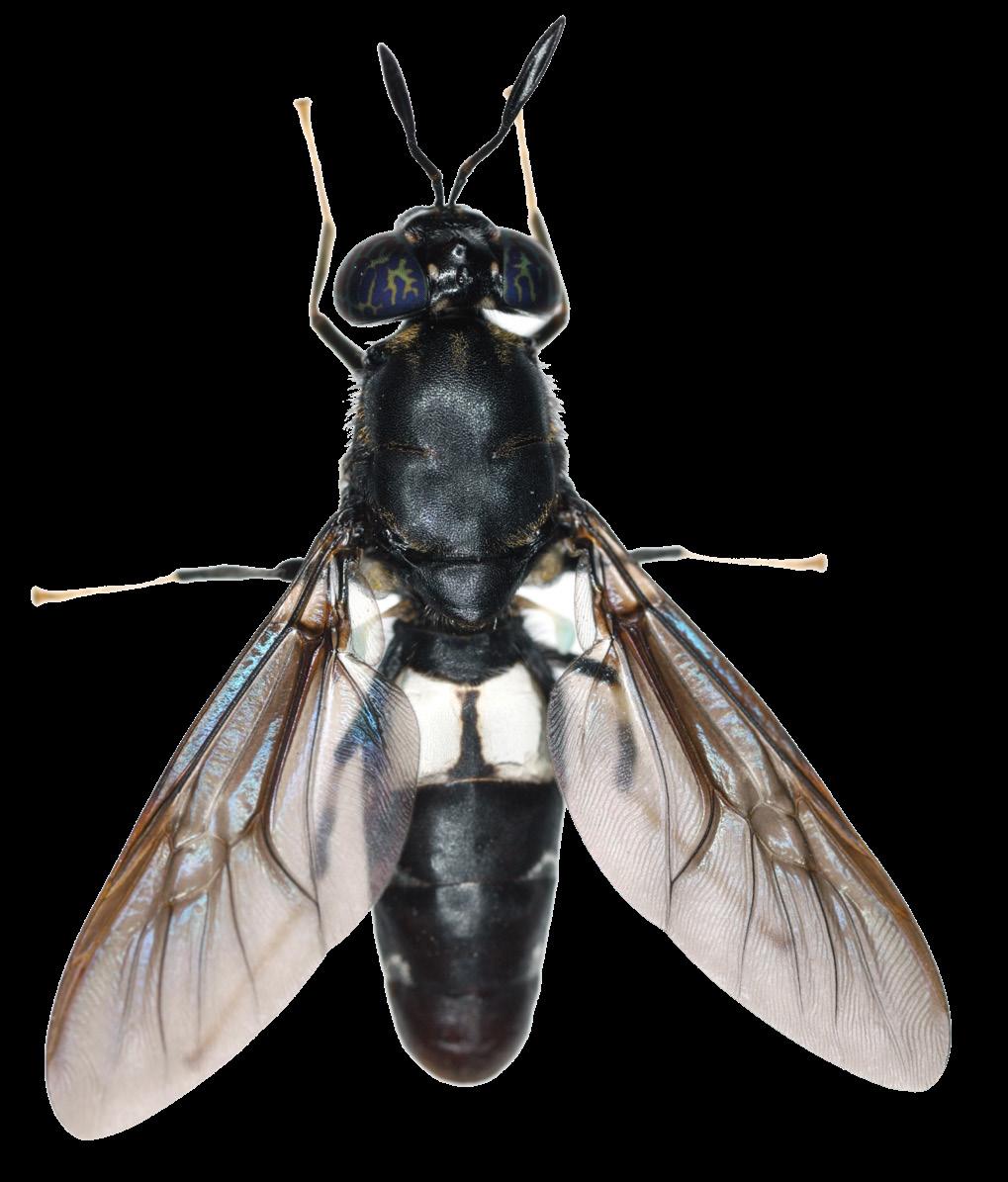
Robber flies aren’t the only flies that support a thriving garden habitat. Syrphid flies - also known as hoverflies - sport a form of mimicry that makes them look more like a wasp or hornet which they use to their advantage to avoid other predators and lay eggs which hatch some very hungry larvae.
Hoverfly larvae can reduce a population of aphids by 70% or more. Aphids feed on the sap of plants and can cause leaf loss, discoloration, increase the likelihood of fungal infections, and transmit viruses to plants. Hoverflies are also generalist pollinators, consuming nectar from a wide variety of plants further enriching the garden. Another fly family is also quite adept at pest patrol - tachinids.
Walker Nature Center Continued
2
on page
Summer | 24 |
WALKER NATURE CENTER
11450 Glade Drive
Dawn to dusk, enjoy year-round access to trails, restrooms and free parking.

CONTACT
703-476-9689
naturecenter@reston.org
FEATURES
72 acres of forested land, a picnic pavilion, demonstration gardens, educational signage, a fire ring, two streams, a pond, a Little Free Library, the entrance to 44-acre Lake Audubon and our education building, known as Nature House.
NATURE HOUSE HOURS
Mon. & Wed.-Fri. 9 a.m. – 5 p.m.
Closed Tuesdays
Saturday 10 a.m. – 1 p.m.
Sunday 1– 4 p.m.
HOLIDAY CLOSURES:
June 19 Juneteenth
July 4 Independence Day

www.facebook.com/WalkerNatureCtr

@walkernaturecenter
Groups: Please call ahead to arrange your visit.
Branching Out is a quarterly publication of the Walker Nature Center (WNC), owned and operated by Reston Association.
The mission of WNC is to foster an environmental stewardship ethic in the community. It is named after Reston’s first Open Space and Nature Center Director, Vernon J. Walker.
Tachinids most closely resemble a plump house fly, though their approach to child rearing is different. Tachinids will glue their eggs to other insects so that the maggot can consume the insect as food. Some species have a sharp ovipositor and will directly inject eggs into the host insect. These somewhat terrifying tachinid tactics provide great pest control services against cabbage worms, beetles, cutworms, sawflies, tent caterpillars and spongy moths, even being used by some forestry and farming facilities. Some larvae will overwinter in the host's body and up to three generations of tachinid flies can be present in a habitat area.
Another fan of injectable eggs is the braconid wasp. Ask any vegetable gardener what their greatest pest is and they will likely answer the tomato hornworm. This thick, heavy bodied caterpillar is notorious for decimating an entire tomato patch in one night and is prevalent in late summer. Yet they are no match for the 1/8 inch long wasp which packs a mighty punch. The female deposits 200 - 300 eggs inside the hornworm's body where they feed on the host. It doesn't take long for a hornworm to succumb to the parasitoids. Braconid wasps are aided by transmission of the polydnavirus which stops a hornworm's immune response, and yet poses no threat to humans. A hornworm affected by a braconid wasp is most noticeable when the larvae emerge to cocoon on the exterior of the caterpillar, resembling grains of rice.
Lacewings are another predatory insect used by nurseries and farms as a natural biological pest control. They can be identified by their lace-like wings and small bodies, which are under 1 inch long. A single lacewing larvae can eat up to 1,000 aphids before it pupates, truly earning its nickname of “aphid lion.” After three weeks in the larval stage they will become adults and feed on nectar, pollen and honeydew - the sugary substance secreted by aphids and scale insects as they feed on plant sap.
An Open Invitation
So how does one attract these beneficial insects to a garden or yard? Move towards creating a habitat through providing a small water source, leaving some twigs and logs for shelter and not using pesticides. Plant native plants and increase the diversity of species. The more diverse the species of plants, the more diverse the species of insects will be, which increases the effectiveness of nature's pest control and contributes to preventing outbreaks.
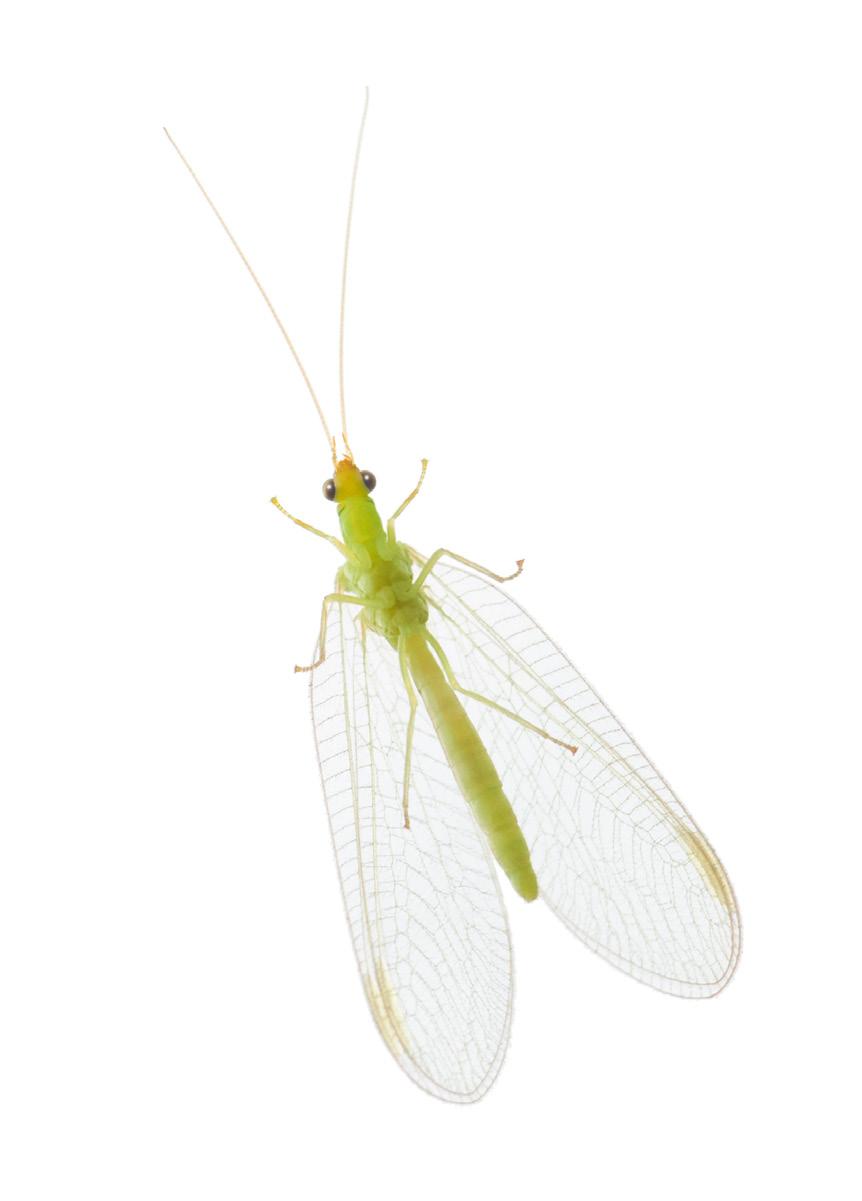
There are specific plants that will attract the adult insects. All of the aforementioned predatory pals are attracted to yarrow and asters. Hoverflies are drawn to coreopsis, echinacea and chives. When herb gardening the braconid wasp will thank you for including cilantro, feverfew and chamomile. Tachinids are especially fond of parsley, and robber flies enjoy many nectar species as long as they're on the sunny side of the garden. With a few changes to one's garden, one can soon enjoy the benefits of a diverse and healthy mini-ecosystem while saving time and money.
Learn more about native plants for Northern Virginia by visiting plantnovanatives.org and stop by the Walker Nature Center to visit the habitat gardens in person.
Branching Out is printed on 100 percent recycled paper using soy ink. It is produced using 100 percent wind power. Please recycle.
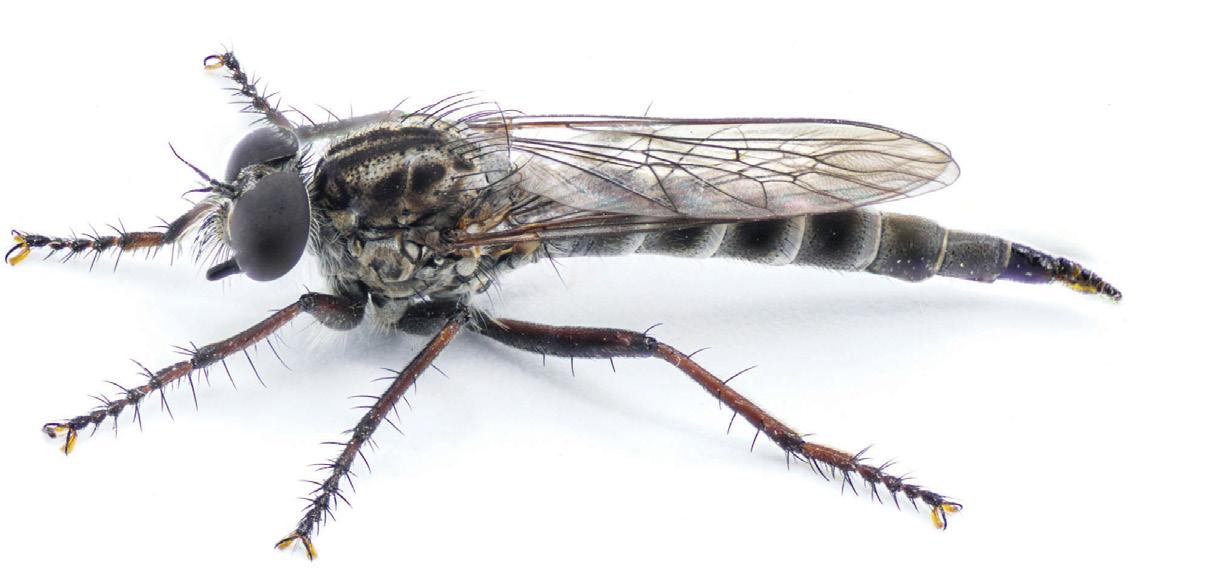
Reston, VA 20191
2
Nature's Pest Control is the Best Control continued from page 1
Wildlife Counts and Classes
Ages: 16-Adult. Free. Meet at the Nature Center, then explore Reston’s natural areas. Advance registration required at www.restonwebtrac.org.
Summer Bird Class: An Introduction
Learn the basics of bird identification and how to look and listen for the common birds of Reston. Register by May 27.
206201205 5/30
Thu 7:00 pm – 8:30 pm
Adults Free
Summer Bird Count
Join us for the annual Summer Bird Count through Reston’s natural areas. Register by May 31.
206201205 6/1
Sat 6:45 am – 12:00 pm
Adults Free
Butterfly Class: An Introduction
Discover the colorful and diverse lives of Reston’s “flying flowers.” Learn to identify Reston’s common butterflies and get a basic introduction to their life history. Register by June 30.
306201205 7/2
Tue 7:00 pm – 8:30 pm
Adults Free
Butterfly Count
Join us for the annual Butterfly Count through Reston’s natural areas. Meet fellow butterfly lovers, learn identification tips and have fun while collecting data on our fluttering friends. Register by July 3.
306201205 7/6
Sat 9:45 am – 1:00 pm
Adults Free
Dragonfly Class: An Introduction
Discover the fast and fascinating lives of Reston’s “flying dragons.” Register by July 29.
306201205 8/1
Thu 7:00 pm – 8:30 pm
Adults Free
Dragonfly Count
Join us for the annual Dragonfly Count through Reston's natural areas. Register by Aug. 1.
306201205 8/3
Sat 9:45 am – 1:00 pm
Adults Free
Please and Thank You
By Ken Rosenthal
Did you make it through winter and spring okay? That’s the question we ask about our wildlife every summer through the summer wildlife counts. We offer free classes for everyone to learn about these wildlife populations, and then request volunteers to help us get out in the field to conduct surveys. The first Saturday in June is our annual Bird Count. Summer bird counts survey species that are here in the summer months by looking for them after migration is over. In July we count butterflies, contributing our observations to the annual North American Butterfly Association’s annual count. Our final count of the summer is the Dragonfly Count. We have decades of observations for all three of these populations, and the data produces an informative snapshot of their populations over time. While these are going on, we also have dedicated teams of volunteers checking and recording breeding success in our many bluebird boxes and surveying leaves for arthropods on our weekly Caterpillars Count!
If you’re looking for other ways to get involved this summer, we have many activities to participate in or volunteer at, including the Fairy Festival on Saturday, July 20. We are also excited to welcome a full number of counselors and campers (ages 3-12) to our nature camps. If you’d like to volunteer at camp, we have some fun opportunities.
We hope to see you at an event or count this Summer!
Thanks to our donors:
306011306 | Sat. July 20 | 10:00 a.m. – 12:30 p.m.
Walker Nature Center | All Ages
$10/RA Member, $15/Non-member
Stroll along a woodland trail decorated with fairy houses. Search for hidden fairies and colorful mushrooms. Sip tea and enjoy a cookie as you listen to a story read by the Fairy Queen. Make a craft and do some fairy house construction. Children and adults are encouraged to wear fairy costumes.
Advance registration is required by July 17 for adults and children who are 18 months or older. Register online at www.restonwebtrac.org.
Julie & Charlie Bond and the Reston Garden Club for the seasonal container gardens, delightful mantel creations, and the lovely floral arrangements at the Welcome Desk. Friends of Reston for providing entertainment during our Spring Festival.
Thanks to our volunteers:
Marco Anguizola; Joanne & David Bauer; Sadie Bisogno; Tessa Bisogno; Julie & Charlie Bond; Jennifer Burns; Tian Din; Jody Douglas; Robin Duska; Lara Ek, John Eppler; June Ferrara; Martha Furniss; Barbara Heubner; Dhruv Jandhyala; Jiwoo Lee; Stella Lee; Sharon McHugh; Anna Najafi; Barbara Paolucci; Sara Piper; Teresa Scotto; Jim Seret; Amy Sherrill; Glenn Simonelli; Michele Simonelli; Abigail Skinner; Jeanette Thomas; Brenda van Doorn; Eve Wallin; Verna Webb; Joanne Williams.
3
OPTIONAL FAIRY HOUSE CONTEST- Build a fairy house at home and enter it in our contest. Participants will vote for their favorite houses during the event. Best house made by a child and best house made by an adult/family will win prizes.

Register online with WebTrac
www restonwebtrac.org
All programs will be held at the Walker Nature Center, 11450 Glade Drive, unless otherwise noted. Refunds are available with two weeks’ notice or if we cancel for any reason. Activities may be canceled due to severe weather, severe weather warnings or low enrollment. Children must be accompanied by an adult.
JUNE
SUMMER BIRD COUNT
See ad on Page 3
206201205 6/1
Sat 6:45 am – 12:00 pm
Adults Free
FANTASTIC FROGS
Frogs fill the air with their calls in spring and summer. Listen to their sounds and see if any actually say, “Ribbit!” Make a frog craft and look for frogs in the pond. Register by May 31. 206111001
Mon 10:00 am – 11:00 am 6/3 OR Tue 10:00 am – 11:00 am 6/4
Ages 18-35 months
$8/RA Member, $10/Non-member
BIRDING SHENANDOAH NATIONAL PARK
We’ll drive! Travel with us to the mountains to search for nesting songbirds at Shenandoah National Park. We’ll also keep an eye out for black bear, bobcat and other wildlife. Trip may include walking over uneven terrain and gentle slopes. Register by May 31. 206201007 6/4
Tue 8:00 am–5:00 pm
Adults $55/RA Member, $70/Non-member
KIDS FISHING DERBY
Bring your fishing rod or borrow one of ours to compete in this fun morning of fishing. No experience necessary. We’ll provide bait, prizes and light refreshments. A fishing license is not required for kids. Adults are not permitted to fish during the kids’ time. Register by June 5.
206101302 6/8
Sat 9:30 am – 11:30 am
Lake Audubon Boat Ramp, 2070 Twin Branches Road
Ages 3-15
$8/RA Member, $10/Non-member
CELEBRATE SUMMER CAMPFIRE
School is out for the summer! Join us around the campfire. Sing songs, share stories, and enjoy a memorable evening full of fun. Make a campfire cone– a yummy twist on a marshmallow treat. Register by June 11.
206011003
6/14
Fri 7:00 pm – 8:00 pm
WNC Fire Ring on Soapstone Drive between Glade Drive and Lawyers Road
All Ages $7/RA Member, $9/Non-member
JUNE BIRD WALK: WALKER NATURE CENTER & SNAKEDEN STREAM VALLEY
206201002 6/23
Sun 7:30 am – 10:30 am
MARVELOUS MONARCHS
Monarch butterflies are not only a delight to see, but they have fascinating life cycles. Discover where these insects live and how far they migrate for the winter. Learn how you can support monarchs and go for a walk to look for the plants they need to survive. Register by June 20.
206011008 6/23
Sun 2:00 pm – 3:00 pm
All Ages $6/RA Member, $8/Non-member
MARVELOUS MUD
Get your hands dirty on International Mud Day! Discover what critters love to live in mud. Take a walk through the woods and make your own mud pie!
Register by June 26.
206121008 6/29
Sat 10:30 am – 11:30 am
Ages 3-5 $7/RA Member, $9/Non-member
JULY
BUTTERFLY COUNT AND CLASS
See ad on Page 3
306201205 7/6 Sat 9:45 am – 1:00 pm
Adults Free
NOISY NATURE
From the chirping of birds to the buzzing of cicadas, nature can be very noisy. Listen to animal sounds and play a guessing game. Make a craft that rattles. Take a walk to look for bees, birds and other noise makers. Register by July 5.
306111001
Mon 10:00 am – 11:00 am 7/8
Or Tue 10:00 am – 11:00 am 7/9
Pony Barn Pavilion, Triple Crown Rd. & Steeplechase Dr. Ages 18-35 months
$8/RA Member, $10/Non-member
FIREFLIES AT NIGHT
What makes those little bugs glow and why do they do it? Learn what they eat and where they live. How can you attract them to your yard? Stroll by Lake Newport and explore Brown’s Chapel Park to catch a glimpse of this bioluminescent phenomenon. Register by July 7. 206011008 7/10
Wed 8:00 pm – 9:00 pm
Brown’s Chapel Picnic Pavilion, 1575 Brown’s Chapel Rd. Adults and Children 5+
$6/RA Member, $8/Non-member
CAMPFIRE FUN
Gather around a crackling campfire. Sing songs, play a game, hear a story and make a s’more. Register by July 9.
306011003
7/12
Fri 7:00 pm – 8:00 pm
WNC Fire Ring on Soapstone Dr. between Glade Dr. and Lawyers Rd.
All Ages $7/RA Member, $9/Non-member
4

FAIRY FESTIVAL
See ad on page 3
Sat 7/20
KNEE DEEP IN A CREEK
Hot days are perfect for dipping your feet in cool water. Explore Snakeden Branch stream looking for frogs, minnows, and other creatures. Wear your wading shoes and clothes that can get dirty. Nets and buckets provided. Register by July 24.
306121008 7/27
Sat 10:30 am – 12:00 pm
Ages 3-5
AUGUST
$6/RA Member, $8/Non-member
DRAGONFLY COUNT AND CLASS
See ad on Page 3
306201205 8/3
Sat 9:45 am – 1:00 pm
Adults Free
SNAKES OF RESTON
Learn which species live in Reston and which is our only venomous snake. Meet a real snake up close and bring your snake questions. Take a walk to the pond and the lake to look for these elusive reptiles. Register by August 1. 306011008 8/4
Sun 1:30 pm – 3:00 pm
All Ages $6/RA Member, $8/Non-member
BEAR NECESSITIES
In honor of Smokey Bear’s birth month, learn about these large creatures occasionally seen in Reston. Go on a “bear hunt” and search the trail for some necessities of a bear’s life. Learn how you can be a friend to the forest. Register by Aug. 2.
306111001
Mon 10:00 am – 11:00 am 8/5
Or Tue 10:00 am – 11:00 am 8/6
Pony Barn Pavilion, Triple Crown Rd. & Steeplechase Dr. Ages 18-35 months
$8/RA Member, $10/Non-member
SMOKEY BEAR CAMPFIRE
Celebrate Smokey Bear’s birth month with some fun around the campfire. Learn how to build a fire and keep it safe. Make a s’more and sing Happy Birthday to our beloved friend. Register by August 6.
306011003 8/9
Fri 7:00 pm – 8:00 pm
WNC Fire Ring on Soapstone Dr. between Glade Dr. and Lawyers Rd.
All Ages $7/RA Member, $9/Non-member
STREAM SLOSH
Dip into a cool stream to escape the heat. Use a net to search for fish and frogs and take a peek under rocks to look for insects. Wear wading shoes and clothes that can get dirty. Nets and buckets provided. Register by August 8.
306011007
8/11
Sun 1:30 pm – 3 pm
All Ages $6/RA Member, $8/Non-member
SUNSET STAND UP PADDLE BOARD
Enjoy an evening discovering the fun of stand up paddle boarding on Lake Audubon. Join a naturalist and observe the beauty of the lake and wildlife from a new perspective. Paddle in the glow of sunset. Boats, safety equipment and instruction provided. Register by August 22.
206201007 8/22
Thurs 6:30–8:00 pm Lake Audubon Boat Ramp, 2070 Twin Branches Road Ages 16-Adult $16.50/Member, $22 Non-member
FROGGY FUN
The pond comes to life with frogs in the summertime. Learn about the life cycle of a frog and observe a tadpole up close. Do you see any frogs in the pond? Play froggy games and create a frog to take home. Register by Aug. 21
306121008 8/24
Sat 10:30 am – 11:30 am Ages 3-5 $7/RA Member, $9/Non-member
5
Yarn-wrapped Fox Craft
Materials
Cardboard
Black pom pom
Orange yarn
White paper
Orange marker
Googly eyes
Tape
Instructions:
1. Cut cardboard into a triangle shape.
2. Cut ears out of paper. Color the outside edge orange.
3. Tape one end of the yarn to the back of the cardboard.
4. Begin to wrap the yarn around the cardboard in different directions.
5. Tape the end of the yarn to the back.
6. Tape the ears to the back.
7. Glue googly eyes and pom pom for the nose.
Fantastic Foxes
By Earl the Squirrel (with help from Kelly Michienzi)
Despite the scare foxes give me, I do find them fascinating. Red Foxes and Gray Foxes live in Fairfax County. Red Foxes are the ones that we see most often in Reston. I’m happy about that because Gray Foxes can climb trees! At least I can run up a tree to escape a Red Fox.
I must say, Red Fox babies (kits) are adorable. They are born in the spring with a gray coat of fur that turns red in about a month. Red Foxes can have up to 12 babies in one litter although 5 or 6 is more common. The kits stay underground in their den until they are about a month old. Then it’s time to explore outside where they play and wrestle with their siblings. Their mom and dad take turns bringing food back to the den and watching their babies.
Foxes love to eat small mammals like squirrels, mice and rabbits. They also eat birds, fish, frogs, crayfish, caterpillars, grasshoppers and fruits. Because they eat meat and plants, we call them omnivores. When a fox is in the mood for a mouse or squirrel, they stalk their prey quietly and then pounce. Foxes have excellent hearing. They can even hear mice underground.
They also have a tremendous sense of smell. Have you ever noticed how a dog’s nose is wet when they come for a snuggle? Foxes have wet noses, too. The moisture helps them to pick up scents. Once their noses and ears have led them to a meal, they use sharp teeth to tear meat into chunks. They don’t chew their food like humans.

Activity: Act like a Fox!
1) Make fox ears! Cup your hands and place them behind your ears. Now speak and see how loud your voice sounds. Take your fox ears down and speak again. Do you notice a difference? Try this in nature.
2) Move like a fox! Walk on your tip toes, then pounce. Try playing music as you tiptoe around. Pounce when the music stops.
3) Sniff like a fox! Find a dried leaf and rip it into small pieces. Take a sniff. Now lick the space between your lip and nose. Smell the leaf again. Does the scent seem stronger with a wet nose?
4) Play the quiet fox game! Gather a small group of friends. One person will be a rabbit. Everyone else will be foxes. Rabbit stands at the finish line with his/her back to a lineup of foxes a distance away. Each fox takes a turn tiptoeing towards the rabbit. If the rabbit hears the fox, rabbit raises its hand, and the fox goes back to the starting line. Play until every fox crosses the finish line. Take turns being the rabbit.

I do have something in common with foxes. We both have big, bushy tails. A fox’s tail is over half of its body length. Our tails are like built-in scarves. When it’s cold outside, we wrap our tails around our faces to stay warm. Foxes also use their white-tipped tails to communicate a warning signal to other foxes. Did you know that foxes can run up to 30 mph and jump over 6-foot fences? Since I just saw a fox trotting through the woods, I better scoot off and hide in the treetops.
Kids’ Corner
6
Making your yard less friendly to ticks
By Ken Rosenthal
Even those who love “bugs” or “creepy-crawlies” likely pause in their adoration at the mention of ticks. Ticks are arachnids, cousins to spiders, daddy long-legs, scorpions and mites. The root of their infamy lies in the fact that they are parasites, surviving by getting their nourishment from the blood of mammals and birds, and occasionally even reptiles or amphibians. Ticks can transmit disease while feeding on their host. It’s probably safe to say there are few “My Favorite Animals” lists that include ticks.
However, fear of ticks should not be a barrier to getting outside, whether you’re going to a park or just your own backyard. There are many things you can do to make your yard less hospitable to ticks. A little knowledge about ticks coupled with a few yard tips can increase the chances that you, your family and your furry friends can better enjoy your outdoor spaces.
Many agencies discuss the use of chemical controls on ticks which are certainly effective. These recommendations are always quick to advise that a certified professional perform the application with an EPA-approved product. However, many of us would prefer to avoid spraying our yards, especially when many pesticides are not very specific in the species they eliminate. Sprays with DEET and clothing infused with permethrin can also be personal solutions while outside.
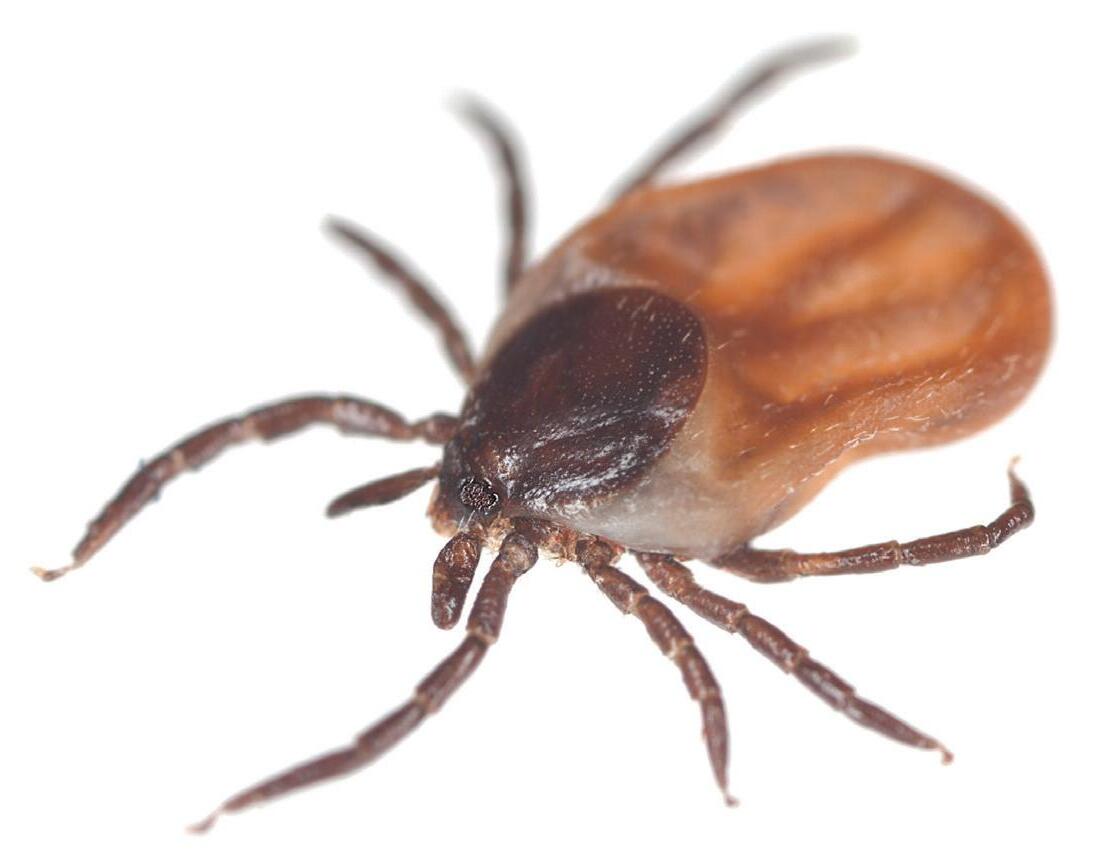
There are chemical-free ways to make your yard less friendly to ticks. Ticks in the genus Ixodes (that can transmit Lyme Disease) like shade and tall vegetation. Humidity is important to their survival and sunny, drier areas are hard for them to flourish in. Remove leaf litter in your yard, mow regularly and clear brush and tall vegetation next to houses, yards and play areas. You can also place play equipment on mulch or wood chip foundations. If you are next to a wooded area, a 3-foot buffer of wood chips or gravel creates a drying barrier that is difficult for ticks to cross. Deer-resistant plants discourage deer, which may have ticks on them, from visiting your yard.
Personal protection (EPA-approved insect repellents, permethrin-infused clothing) is always the least environmentally impactful way of protecting oneself from ticks in any outdoor setting. Be sure to check yourself and others regularly when outside in areas that may have ticks. Remembering and practicing these tips helps them become habits, and that will make these safeguards feel like just another part of enjoying the outdoors.

7
www.reston.org
Walker Nature Center
11450 Glade Drive
Reston, Virginia 20191
11450 Glade Drive
Register: Online at www.restonwebtrac.org
Nature Tots
Ages: 3-5 by start date
Days: Monday-Friday, one-week sessions
Half-day: 9 a.m.-12 p.m.
OR 1 p.m.-4 p.m.
Fee: RA members: $130/session
Non-members: $156/session
Session 1A: June 17-21
Nature Detectives
Session 1B: June 24-28
Fur, Feathers and Fins
Session 4A: July 29-August 2
Animal Olympics
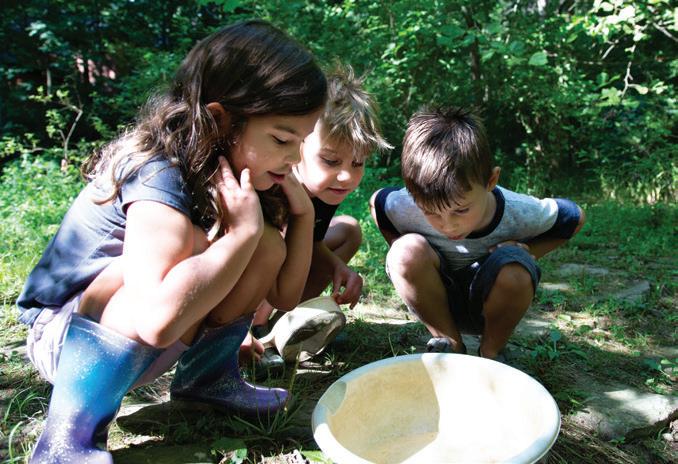
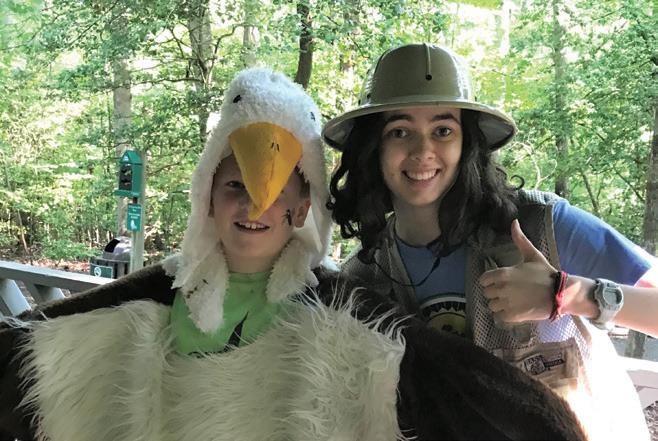
Walker’s Rangers
Ages: 6-9 by Sept. 30, 2024
Days: Monday-Friday, one-week sessions
Full Day: 9 a.m.-3 p.m.
Fee: RA members: $255/session
Non-members: $305/session
Session 2A: July 1-5
Nature Artists
Session 2B: July 8-12
Wild about Wildlife
Session 3B: July 22-26
Summer Splash
Session 4B: August 5-9
Nature Olympics
Young Naturalists
Ages: 10-12 by Sept. 30, 2024
Fee: RA members $300/session
Non-member $353/session
Session 3A: July 15-19
Aquatic Explorations
Session 5A: August 12-16
Ecology 101
Looking for volunteers to provide camp assistance. For more information, call 703-435-6518 or KMichienzi@reston.org.
Come to CAMP at the Walker Nature Center
Winter 18/19 VolumeSummerTwenty | 24 |















